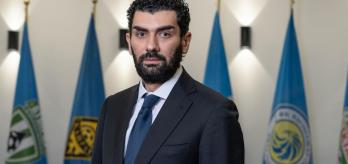“A national football association has a duty to fulfil its vision and mission,” says Mkhonta, who is a graduate of the FIFA Technical Leadership Diploma. “So, one of the strategies is to go out and share the vision and mission with the stakeholders of the football association.”
Communicating simply and effectively as well as displaying credibility and integrity are important behaviours for a technical director to demonstrate, believes Mkhonta. “It’s very important for a technical director to possess leadership skills, because they should be convincing to the people they are recruiting or persuading,” explains Mkhonta. “So being reasonable, sincere and inspirational is key to persuade and convince people to work with and for the football association. That is very important. Then when it comes to communication, the message should be clear, simple and understandable for the people you are communicating with.”
By working in this way, Mkhonta believes technical directors can help National Associations work more collaboratively with important stakeholders in the game. “If you can do this, there is a better chance of having people working collectively and having close cooperation when performing their various activities. Once the mission and the vision are accepted by the people, the chances of being successful in delivering the football association’s mission will be very high.”
Overcoming individual and collective barriers
Mkhonta acknowledges that resistance and overcome “barriers” is part of the role of the technical director and one that should be approached with a variety of strategies. “A normal way to deal with the blockers or the people who come with resistance, is to engage them and bring them on board. You need to find out what is the root cause of the resistance and analyse it: is it individual? Is it collective? If it’s individual, isolate the individual and convince. If it is collective, the best way is to bring them around a table and try and come out with a clear, bigger picture.”
The importance of process and policy in influencing and persuading
Developing clear policies and procedures, as well as having a feedback process, play a key role in helping to influence and persuade, believes Mkhonta. “It’s very important when you talk to people, when you try to convince them, the first thing what they look at is the credibility and your integrity,” he explains. “Coming up with guidelines, such as policies, procedures, when handling situation is very key, because that will help you to avoid personal attachments, nepotism and even gossiping when dealing with issues.
“It is important to remain loyal to the football association even in trying times - that is very important. Taking care of your position and making sure that you maintain a good reputation in your workplace is very, very important.”
Ensure your strategy has goals and targets
Ensuring technical development strategies are “actionable” with clear delegation of responsibilities is another way to build trust within an organisation and help influence and persuade.
“Performance managements is very important,” explains Mkhonta. “Because any strategy without goals or targets is not good at all. People should strive to achieve the set goals. The strategy must be actionable. Break it into segments: it must be simple and understandable to the people. In that way, it will be easy for everyone in the football association to influence and persuade people towards the achievement of the set goals.”





















